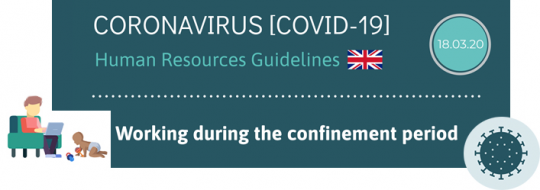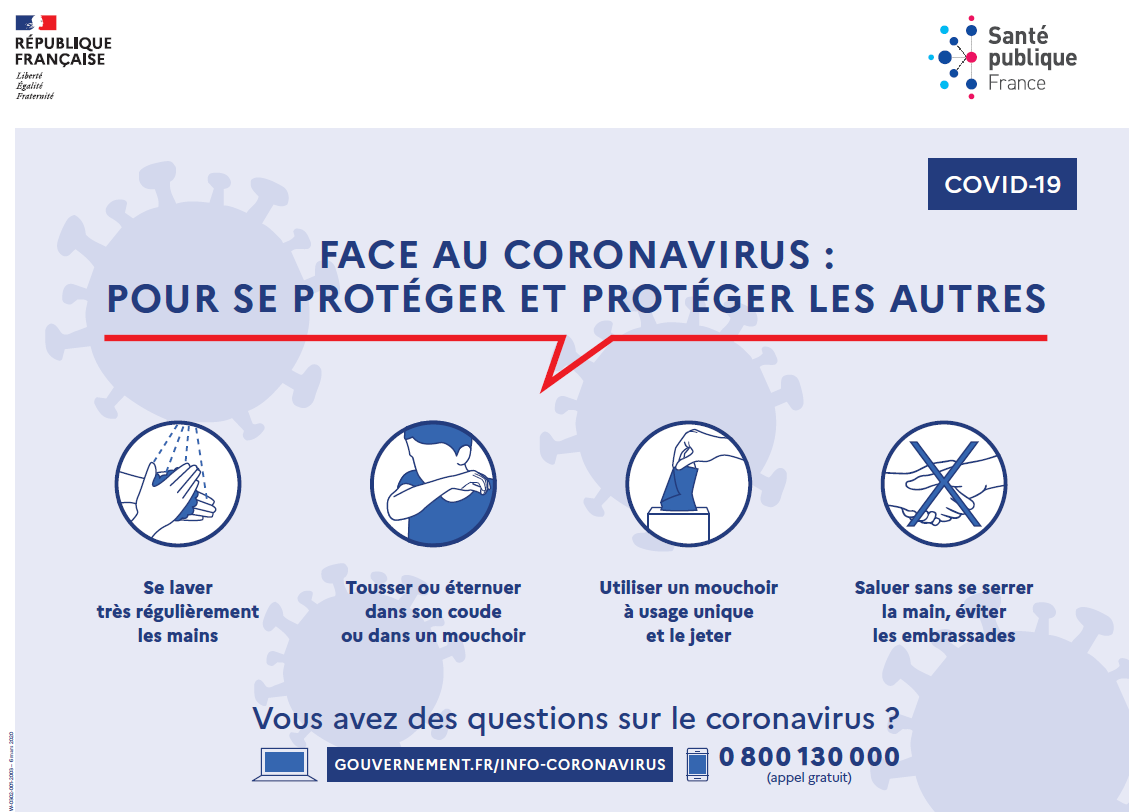Coronavirus: INRAE’s crisis plan for the COVID-19 epidemic is being implemented
Published on 14 March 2020

On Monday night, President Macron announced the adoption of new measures related to social distancing:
Attestation form for movements (in French)
On the evening of March 14, France's prime minister asked all of the country's citizens to respect recommendations related to social distancing, which notably include limiting any non-essential meetings, personal interactions, and movements outside the home, as well as to adopt behaviours to limit transmission.
On March 15, INRAE Chair and CEO Philippe Mauguin asked the whole INRAE community to apply these recommendations, by following the guidelines set out in a message received on Sunday from the Ministry of Higher Education, Research and Innovation. These measures are as follows:
All employees (HR document 18/03/2020):

- should preferentially use telecommuting: any work that can be done via telecommuting must be done via telecommuting. Any member of the staff can submit their request to telecommute via email; while this request can be refused, such a refusal must be justified. Any personnel who must stay home to care for their children must preferentially telecommute.
- remain at home in the case of illness: those who have been granted medical leave by their primary care physicians will receive the same benefits as during normal medical leave.
- can request special authorisation to be absent from work: if neither of the above solutions is feasible, employees can ask to be given a special authorisation that will permit their absence from work (autorisation spéciale d’absence [ASA]). As quickly as possible, the institute's administration will provide any such employees with written authorisation that excuses their absence. This authorisation can be delivered automatically (without an employee specifically requesting it) if its delivery is deemed to be in the interests of the institute and society in general given the aim of reducing the risks of the epidemic. This special authorisation does not require one day’s pay to be deducted as is the case for normal medical leave (jour de carence).
- Individuals belonging to vulnerable groups: employees who face greater health risks in the face of the epidemic should definitely be granted the ability to telecommute or, if that is impossible, be granted the special authorisation allowing their absence. Based on recommendations from the French Public Health Council, these groups include individuals who are pregnant; who have kidney, heart, or respiratory diseases or liver cirrhosis; who have insulin-dependent diabetes or related complications; who are chronically obese; and/or who are immunocompromised.
Exemptions from telecommuting will be applied for certain individuals because their work is essential and requires their physical presence. This work includes:
- Essential activities that are part of the centres’ business continuity plans (plans de continuité de l’activité [PCA]) and that require staff to physically maintain vulnerable biological collections, animal facilities, payroll services, etc.; Or, for activities that do not form part of a business continuity plan,
- Activities by laboratories that are researching the COVID19 epidemic or comparable epidemics;
- Research activities within certain specific laboratories that cannot be interrupted without resulting in the irreparable disruption of crucial, sensitive, and/or complex scientific projects, as well as projects that would be burdensome to reinstate.
As of Monday, March 16, the Ministry has asked that telecommuting be used to carry out all services and functions that can be performed via this medium (when needed, employees are allowed to go to their workplace to collect any necessary work materials as long as they avoid using public transport).
For other services and functions, we need to organise the continuity of the institute's work, which will require employees to be temporarily present (on this Monday at the least). These efforts will allow us to properly put in place safety measures and/or end ongoing experiments and to structure essential services that will allow work continuity.
The centres’ presidents will be meeting with the crisis’ units this Monday to create a list of essential activities, the employees involved, and the measures needed to allow these activities to continue.
INRAE staff, all information on intranet here
Basic protective measures against the new coronavirus (WHO website)

A research project on COVID-19 conducted by INRAE
Faced with the emergence of the new coronavirus COVID-19 in China, we do not have a preventive (vaccine, antibody) or curative (antiviral) treatment. Developing a vaccine will take at least a year and we do not know how the epidemic will evolve and whether this virus will still be the same or whether a new coronavirus will have emerged. This research project conducted by INRAE aims at developing a replicon for COVID-19 which will enable the screening of antiviral compounds on living cells. Contrary to the virus, the replicon is not infectious and cannot infect humans or any other species. This project is coordinated by the Molecular Virology and Immunology Research Unit (VIM) at INRAE Île-de-France - Jouy-en-Josas and is led by J.-F. Eléouët.
